Social Sciences > QUESTIONS & ANSWERS > TEFL Questions and Answers Already Passed (All)
TEFL Questions and Answers Already Passed
Document Content and Description Below
TEFL Questions and Answers Already Passed The Grammar-Translation method ✔✔Students have to memorise grammar rules and vocabulary and practise by translating sentences from their mother tongue ... into the foreign language. There is little time spent developing oral skills. Direct Method or Oral method or Natural method ✔✔This method advocates teaching in only the target language. This method also focuses on teaching oral skills, practice in having conversations, and improving pronunciation. Writing and reading is developed later. Grammar is learnt using the inductive approach. Audio-Lingual method ✔✔This is a drilling method where a student listens and then repeats. Students practise different dialogues for different situations Structural-Situational method ✔✔A model pattern is introduced and often practised with drilling. However, context is added to the scenarios. Grammatical rules are learnt one at a time. Task Based Learning ✔✔With this form of learning, the students are given a task and try to work out the structure themselves. Often there is no formal instruction and students must find the solution themselves. Silent Way ✔✔he teacher will say as little as possible and encourages students to create their own language, prompted by physical objects. Immersion: ✔✔students are immersed in English throughout the day in school. They are taught all subjects in English. This method is often used in Asian schools. Lexical Approach ✔✔In this approach, the students are taught the most commonly used lexical chunks of words and structures. The idea is that common phrases are taught Eclectic Approach ✔✔all of the above teaching methods and bits from the Communicative Approach below and uses styles which suit learners at different levels. Communicative Approach ✔✔Drilling is a form of repetition, getting students to repeat after you. Drilling comes from the behaviourist theorists of the 1950's who concluded that habit forming was a good way to learn a new language Drilling: ✔✔Drilling is a form of repetition, getting students to repeat after you. Drilling comes from the behaviourist theorists of the 1950's who concluded that habit forming was a good way to learn a new language Intrinsic ✔✔This student tells us that she does everything she can to get better at English. Her problem is that her family does not have enough money to help her Extrinsic ✔✔My parents are making me come to the Extra English lessons Intrinsic ✔✔This student spends her spare time organising an English Speaking club at her school Extrinsic, ✔✔The school forces me to learn English Instrumental ✔✔Learning English will improve your chances of finding a better job Integrative ✔✔n individual has to take an English Language Test to gain citizenship in the UK true ✔✔An item of language can be divided into Structural, Lexical and Phonological items to help students understand better. true ✔✔One of the most straight forward ways to introduce a new item of Grammar, Lexis or Phonology is to use the Presentation-Practice-Production Technique? Adding context to structure is an essential part of adding meaning to a new item. ✔✔true A Teacher must try to explain the following during a lesson: ✔✔meaning The correct answer is: This method is used in a traditional setting where rules are introduced first then practised. - Deductive, In this method students practise specific dialogues for specific scenarios and drill. - Audio-Linguistic, Students spend the day learning different subjects in English. - Immersive, It's an inductive method, using target language only, focusing on oral skills and conversations. - Direct Method, Students have to memorise Grammar rules. - GrammarTranslation, Rules are worked out by students before formal instruction. - Inductive, 3 stages are used in the lesson, new rules are introduced, then an activity to practise followed by a more creative practice activity. - Present-Practice-Production ✔✔ The correct answer is: Create a Mind Map - Eliciting new vocabulary, Create a Timeline. - Showing Verb Tenses, Create a table with rules of structure. - Grammar Table, Draw a picture of different jobs. - Introducing new vocabulary, Write a word on the board showing where the emphasis should be. - Intonation ✔✔ The correct answer is: Getting students to look up words in groups using a bi-lingual dictionary. - Good, Writing instructions on the board and giving students 5 worksheets each. - Not so good, Using realia. - Good, Using mime to try to elicit a new word. - Good, Using Flashcards with images that are unclear and too small. - Not so good ✔✔ The correct answer is: What do you think about the present perfect? - Incorrect, Does my shirt have long or short sleeves? - Correct, Is this concept difficult? - Incorrect, Do you understand? - Incorrect, How many times a week do I wash my hair? - Correct ✔✔ The correct answer is: Drilling should be supported by modelling a new item., Get your students to practise Drilling using different moods like happy or sad. , It's a good idea to support Drilling by showing intonation and stress on the board. ✔✔ The correct answer is: If you find yourself really out of your depth then ask your partner. - Incorrect, Work with the person to your right. - Correct, If you need any help don't be afraid to give me a shout. - Incorrect, Would you mind if you work with a partner? - Incorrect, Ask me if you don't understand. - Correct ✔✔ All of the following are ways to elicit - except one. Please select the odd one out. ✔✔Explaining the meaning What does CCQ stand for? ✔✔Concept Checking Question Competitions - Teams, Project work - Groups, Debates and Presentations - Horseshoe, Examinations and Tests - Rows, Sometimes a good idea for free writing. - Individual, Everyone can see the board and the teacher can make eye contact. This style reduces distractions. - Rows ✔✔ Offering feedback to your learners on a regular basis offers many benefits except one. Please select the odd one out ✔✔Helps tackle all behaviour problems "The Teacher has all the knowledge and should do most of the talking." ✔✔false The correct answer is: Being serious and never smiling will mean your students respect you. - False, Using worksheets every lesson with drilling will improve learners' desire to learn more. - False, Using a textbook every lesson will give learners a chance to be creative. - False, Using words like "well done, outstanding, excellent" increases motivation. - True, Promising a school trip and never going is bad for motivation. - True ✔✔ The correct answer is: To create an informal piece of writing updating your status. - Facebook, To give learners a chance to publish written material so that parents can see their children's work. - Blog, To connect to another school in another country using face to face communication. - Skype, To enable learners to look up examples at home using your website. - Wikispaces, To write an email requisition for more information about a summer internship. - Formal email ✔✔ bus ✔✔Common , Concrete , Countable doctor ✔✔Common , Concrete , Countable courage ✔✔Common, Abstract , Uncountable James ✔✔Proper , Concrete , Countable love ✔✔Common , Abstract , Uncountable The correct answer is: A word that is used to express emotion or surprise. - Interjection, A word that refers to people, places, things and ideas. - Noun, A word that is used in the place of a noun. - Pronoun, A word that is used to describe and modify a verb, adjective or other adverb. - Adverb, A word that is used to join sentences or words together. - Conjunction, A word that is used to describe or specify a noun or pronoun. - Adjective, A word that is used to show where and when something is. - Preposition, A word that is used to show an action or state of being. - Verb, A word that comes before a noun, the most common are "the" or "a". - Determiner ✔✔ The correct answer is: He spent all night driving and he felt tired. - Conjunction, We all had dinner in the restaurant in the square. - Noun, We left the Airport at about 10pm but got caught in the storm. - Verb, If you want to win the marathon you have to believe in yourself. - Pronoun, My daughter said, " Wow that tastes good!" - Interjection, The stairs were too steep for her to walk up, she caught the lift instead. - Determiner, He ran as fast as his legs would carry him. - Verb, The woman was not strong enough to lift her heavy suitcase up the stairs. - Adjective, We went to the supermarket to get some baby food and some milk. - Preposition, We spent nearly 10 hours walking but we all still enjoyed it. - Conjunction, She felt completely exhausted after a long week at work. - Adverb, He didn't have anything to cover it with. - Pronoun ✔✔ Quickly is an Adjective ✔✔false Sometimes is a Noun. ✔✔false Where are Emily's toys? "toys" is a Pronoun. ✔✔false If you walk through the jungle, you will need some mosquito spray. - First, If I had won the race that day, I would have been the oldest winner. - Third, If the baby cries, she needs attention. - Zero, If I won the race, I would move to the USA to train. - Second, If you go to a Thai Temple, you take your shoes off and cover your arms and legs. - Zero, If I spoke English, I would go and work in England. - Second, If I found gold on my land , I would look for more. - Second, If you train hard for the run, you will win. - First, If I had cooked the beef instead of the chicken, I would have finished at the top of the class. - Third, If I had departed a little earlier that day, I would have avoided seeing the accident. - Third, If you leave the gas on, you will blow up the house. - First, When Jack sees his wife, he smiles. - Zero ✔✔ Making a guess about the future: I bet she will be having a baby very soon. - Future Continuous, Actions that started in the past and continue to the present: He has been writing a book for two years. - Present Perfect Continuous, Actions in progress at the same time in the past: I was cleaning the kitchen while my wife was washing the car. - Past Continuous, Actions in the past which have an effect on the present: He has finished his shift. - Present Perfect, Events in the past which are now finished. - Past Simple, Temporary actions: Jack is working as a waiter in the summer holidays. - Present Continuous, Arrangements we can't change like a train timetable: The train leaves at 3pm. - Present Simple, Predictions: It will rain later if it stays this hot. - Future Simple, Completion of an action before a specified point in time in the future - Future Perfect, Present actions: Jack is talking with friends. - Present Continuous, Actions which began in the past and continue in the present: He has worked as a policeman for 20 years. - Present Perfect, Unhappy about the past: I wished I had eaten more before the Test. - Past Perfect, Cause of a future situation: In ten minutes you will have been driving for 12 hours, your eyes are looking tired. - Future Perfect Continuous, Looking at the cause of an action. - Past Perfect Continuous, Habits and routines: I get up at 8am. - Present Simple, Completed action before another action in the past: I had finished my work before I went running. - Past Perfect ✔✔ Subject + will have + Past Participle - Future Perfect, Subject + will + be + Present Participle or "ing" - Future Continuous, Subject + Present of "to have" + Past Participle of Verb - Present Perfect, Subject + will have been + Present Participle of verb or "ing" - Future Perfect Continuous, Subject + Present form "to have" + been + Present Participle of Verb or "ing" - Present Perfect Continuous, Subject + Present Form of the Verb - Present Simple, Subject + Present of "to be" + Present Participle of Verb or "ing" - Present Continuous, Subject + Past form of "to have"+ been + Present Participle or "ing" - Past Perfect Continuous, Subject + will + Present form of the Verb - Future Simple, Subject + Past form of "to be" + Present Participle of Verb or "ing" - Past Continuous, Subject + Past form of "to have" + Past Participle of Verb - Past Perfect, Subject + Past form of the Verb - Past Simple ✔✔ Jack is critically ill. - Adverb, Here is a crocodile. - Countable Noun, Jack is a terrible singer. - Adjective, Where is the book? It's on the table. - Definite Article, The House has a big garden. - Indefinite Article, I listened in the lesson but I didn't remember it very well. - Adverb, All that is said during this meeting stays between you and me. - Pronoun, It took a great deal of courage to dive into the swimming pool and save the boy. - Abstract Noun, I called you on Monday. - Preposition, He was a great tennis player but he lacked commitment. - Conjunction ✔✔ Using a real life object (Realia) to show the meaning of a new word. - Concrete, Acting to try to convey a feeling of happiness. - Abstract, Using a flashcard to show the new word. - Concrete ✔✔ These words are vital for creating a sentence in English. They can describe a physical movement like walking or running or how a person thinks or feels. - Verbs, These words refer to the names of specific people or places. - Proper Nouns, These words are descriptive words used to describe nouns. - Adjective, These words add detail to a sentence and describe a verb. - Adverb, These words can be identified through one of the five senses (taste, touch, sight, hearing, smell). - Concrete Noun, These words come before nouns. - Articles, These words are used to connect two sentences together to help the flow of writing. - Conjunction, These words can be used to replace nouns. - Pronouns ✔✔ Least - Superlative, Worse - Comparative, Best - Superlative, Better - Comparative, Farther - Comparative, Most - Superlative ✔✔ Have you eaten dinner yet? - Present Perfect, He said that he had been waiting for ages before she arrived for the date. - Past Perfect Continuous, Jack will not have learnt anything if he doesn't go to class. - Future Perfect, Will you be coming to Chiang Mai next week? - Future Continuous, I hadn't read anything before the test. - Past Perfect, Will you jog today? - Future Simple, He has been waiting for over 12 hours at the Airport. His plane is delayed badly because of the weather. - Present Perfect Continuous, Thailand isn't getting wealthier each year. - Present Continuous, He boarded the plane and sat in business class. - Past Simple, Will he have been writing for that many years? - Future Perfect Continuous, The teacher asked when he wasn't working on his project. - Past Continuous, I live in Chiang Mai. - Present Simple ✔✔ He has worked as a teacher for 10 years. ✔✔Present Perfect We have been living in Mumbai for one month. ✔✔Present Perfect Continuous I wished I had not taken that wrong turn. ✔✔Past Perfect By next year Bob and Kathy will have been living together for 50 years. ✔✔Future Perfect Continuous Victoria will have lived in New York for 3 years in 2015. ✔✔Future Perfect It's vital that you know every single Grammar Rule and Verb Tense when you start teaching. ✔✔false [Show More]
Last updated: 1 year ago
Preview 1 out of 14 pages
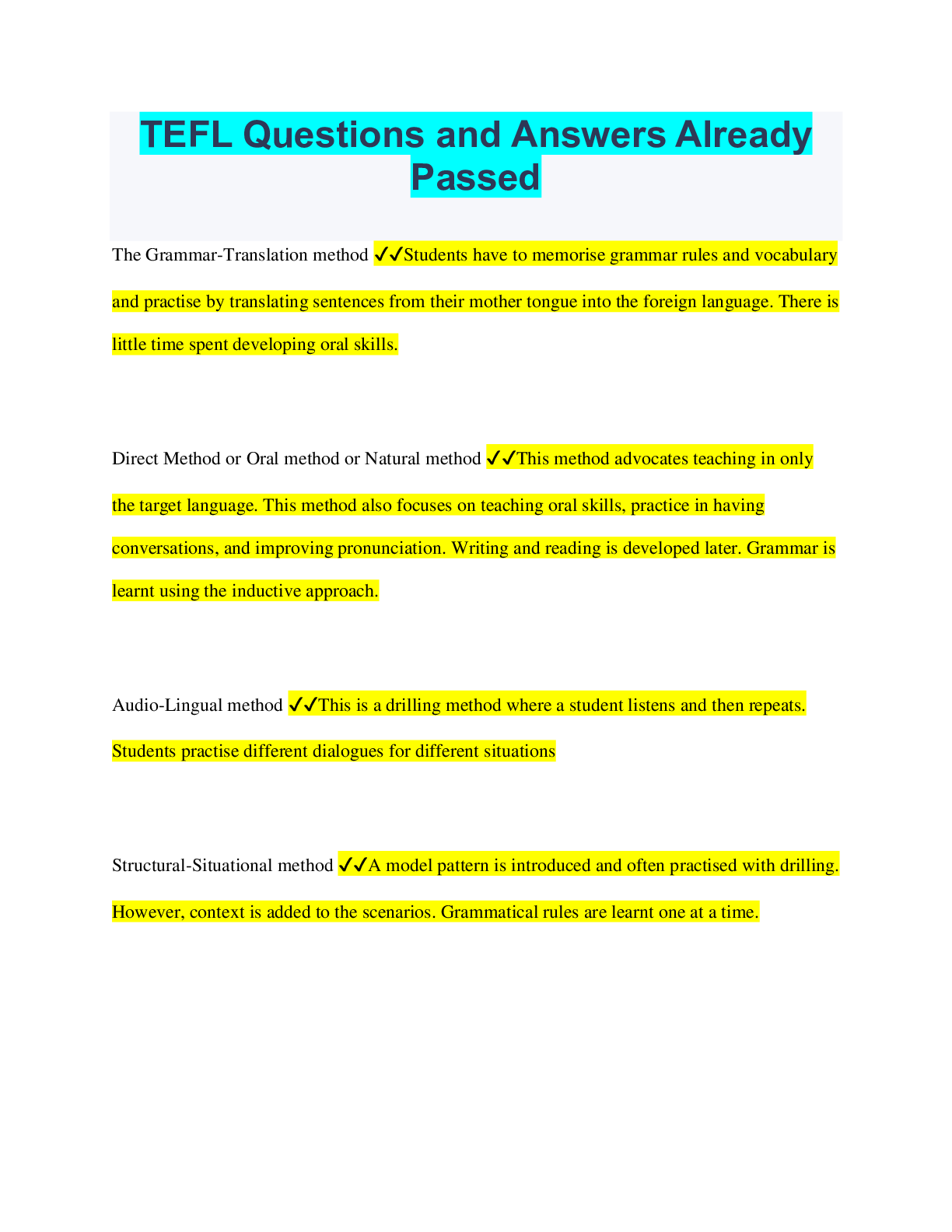
Buy this document to get the full access instantly
Instant Download Access after purchase
Buy NowInstant download
We Accept:

Reviews( 0 )
$10.00
Can't find what you want? Try our AI powered Search
Document information
Connected school, study & course
About the document
Uploaded On
Jul 21, 2023
Number of pages
14
Written in
Additional information
This document has been written for:
Uploaded
Jul 21, 2023
Downloads
0
Views
74


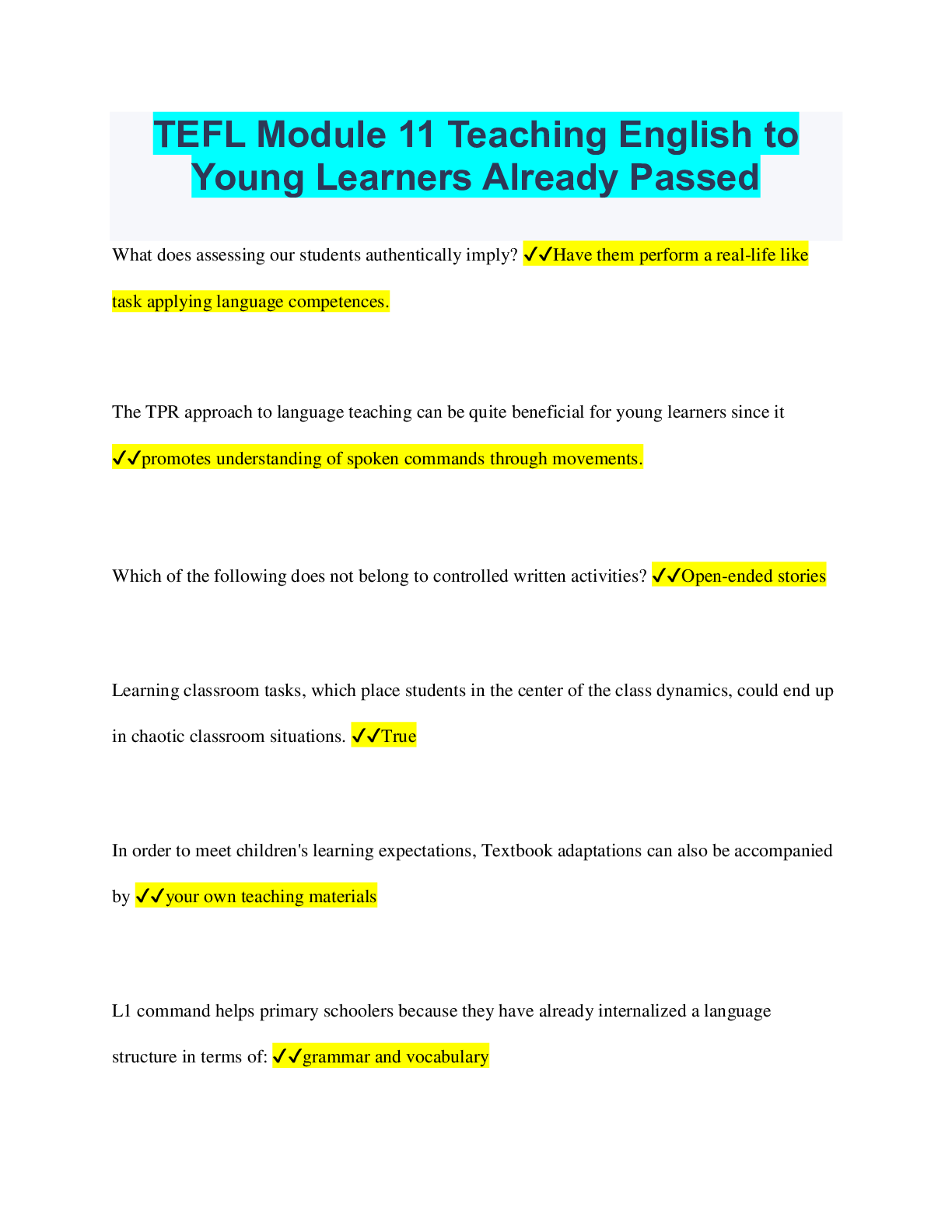
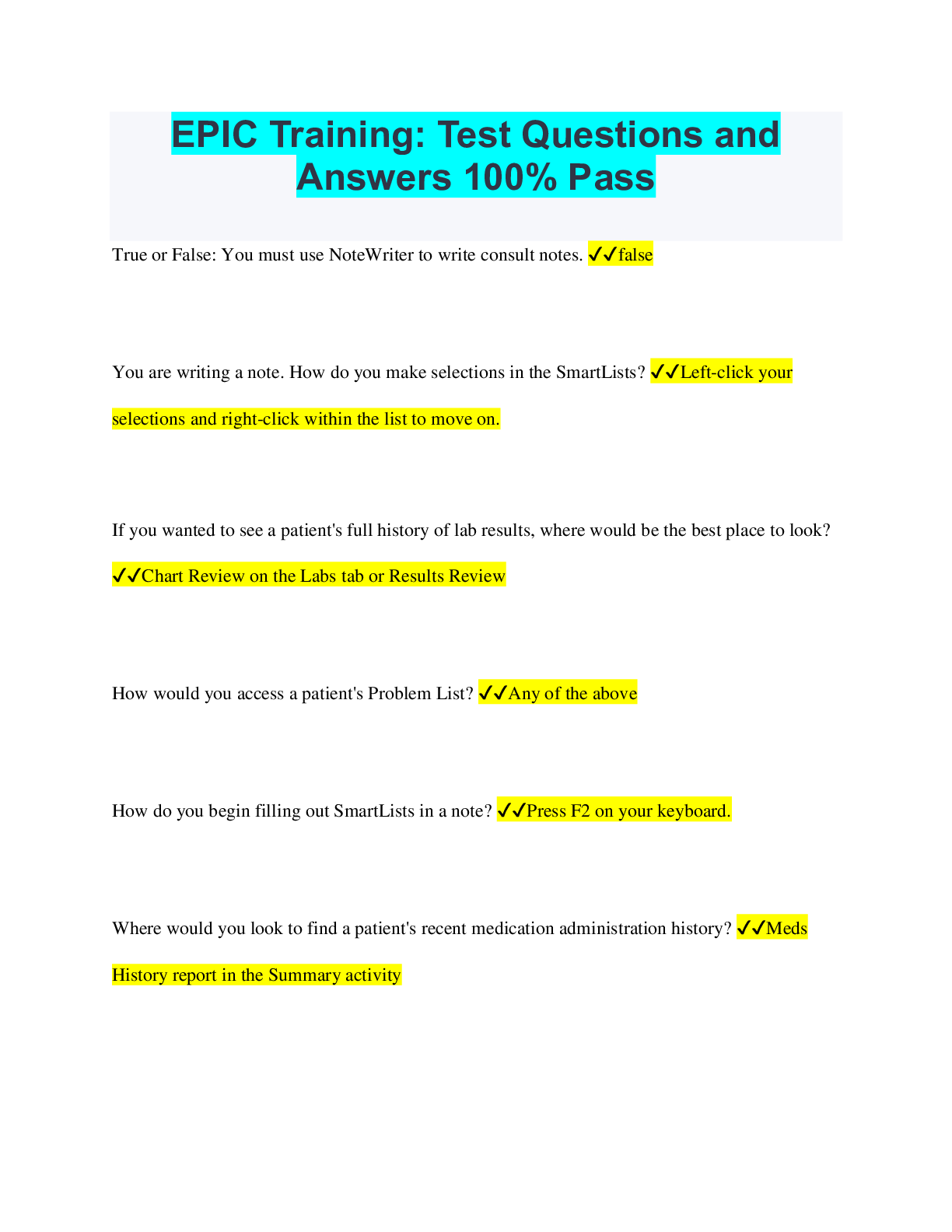
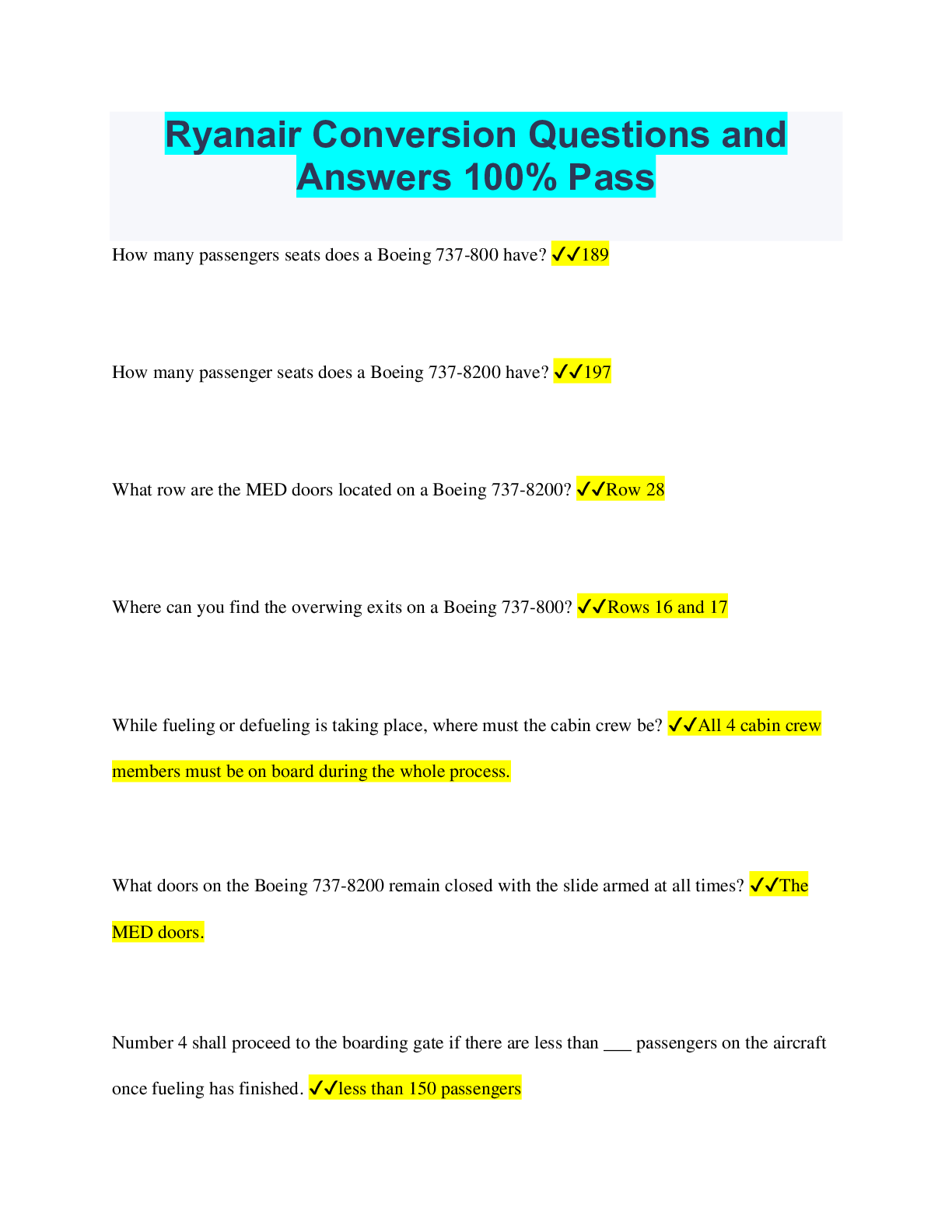
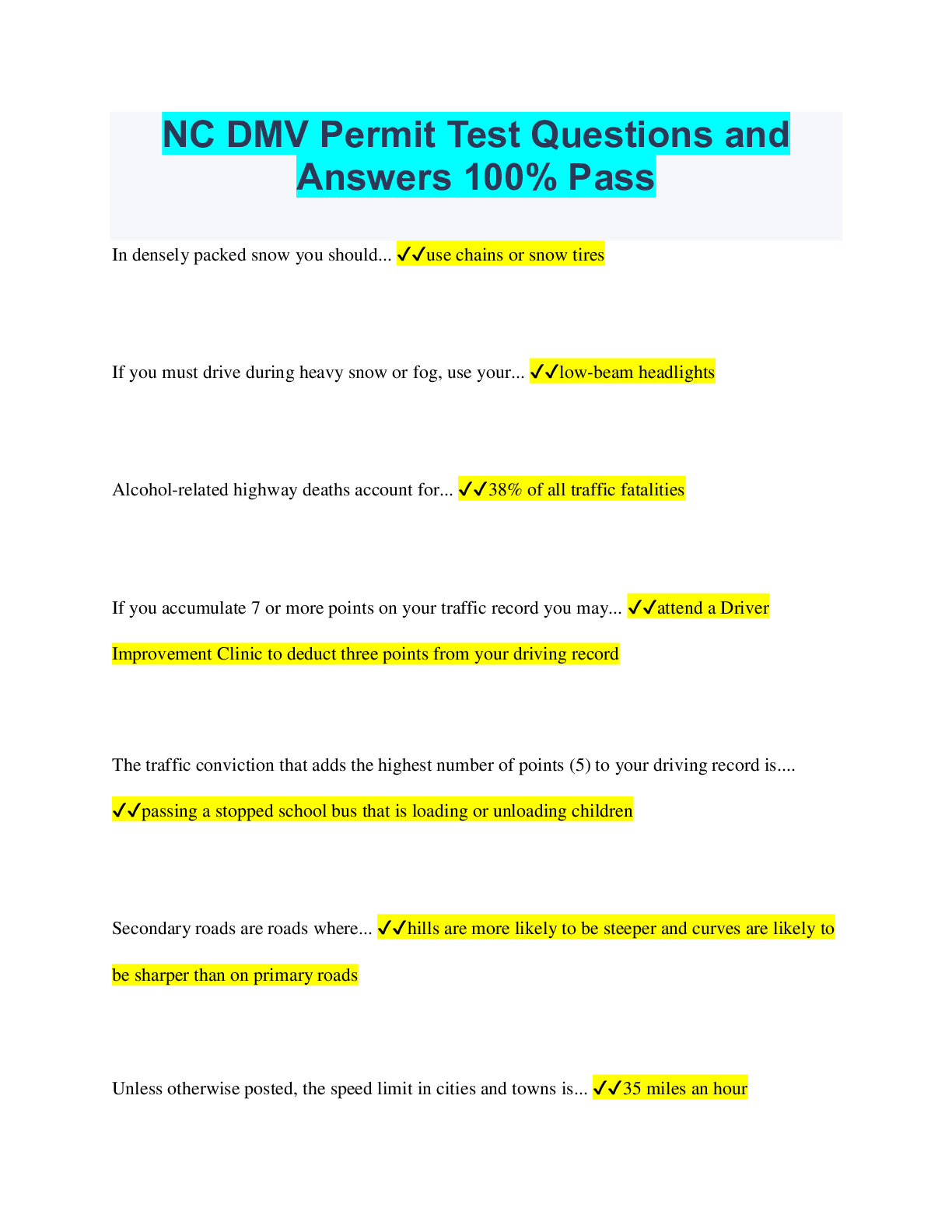
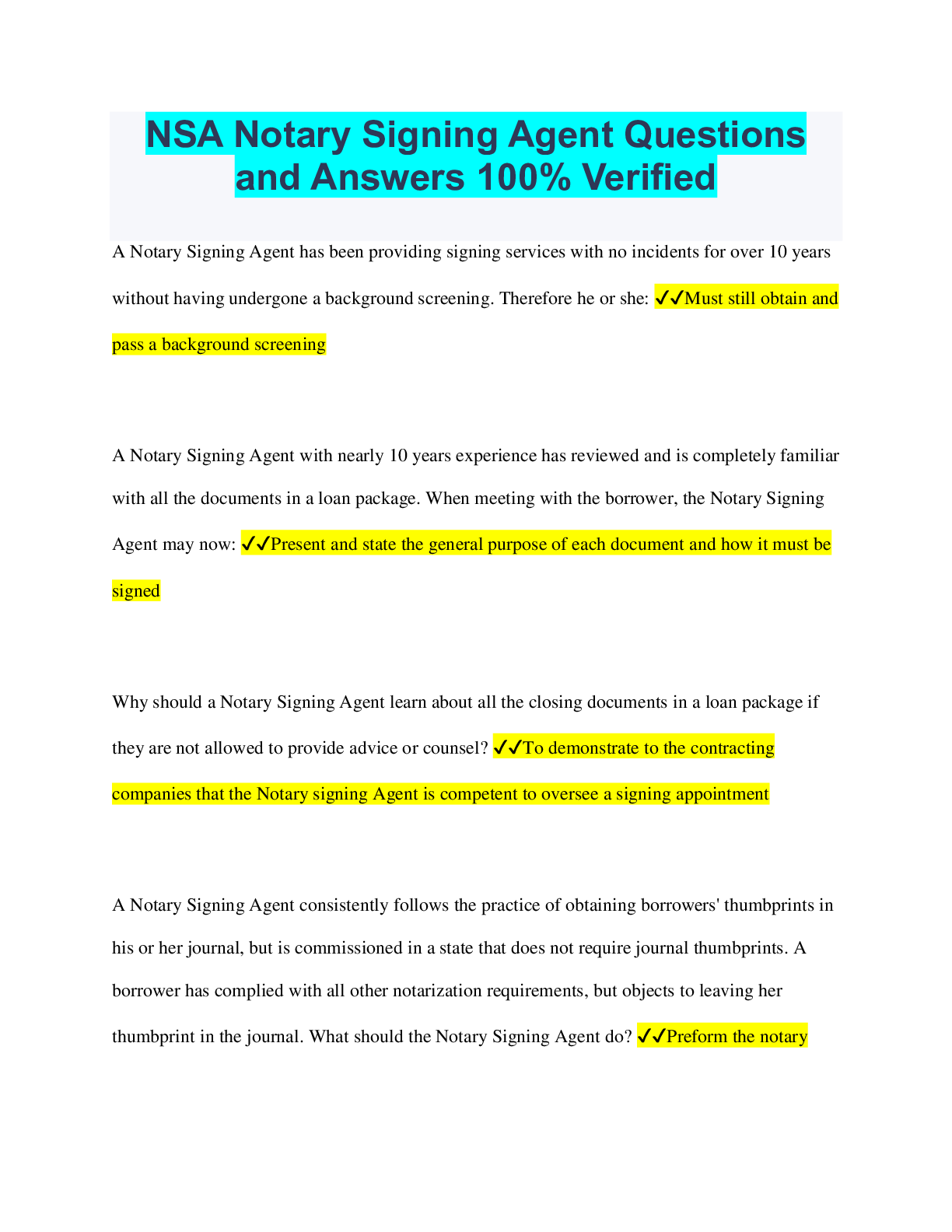
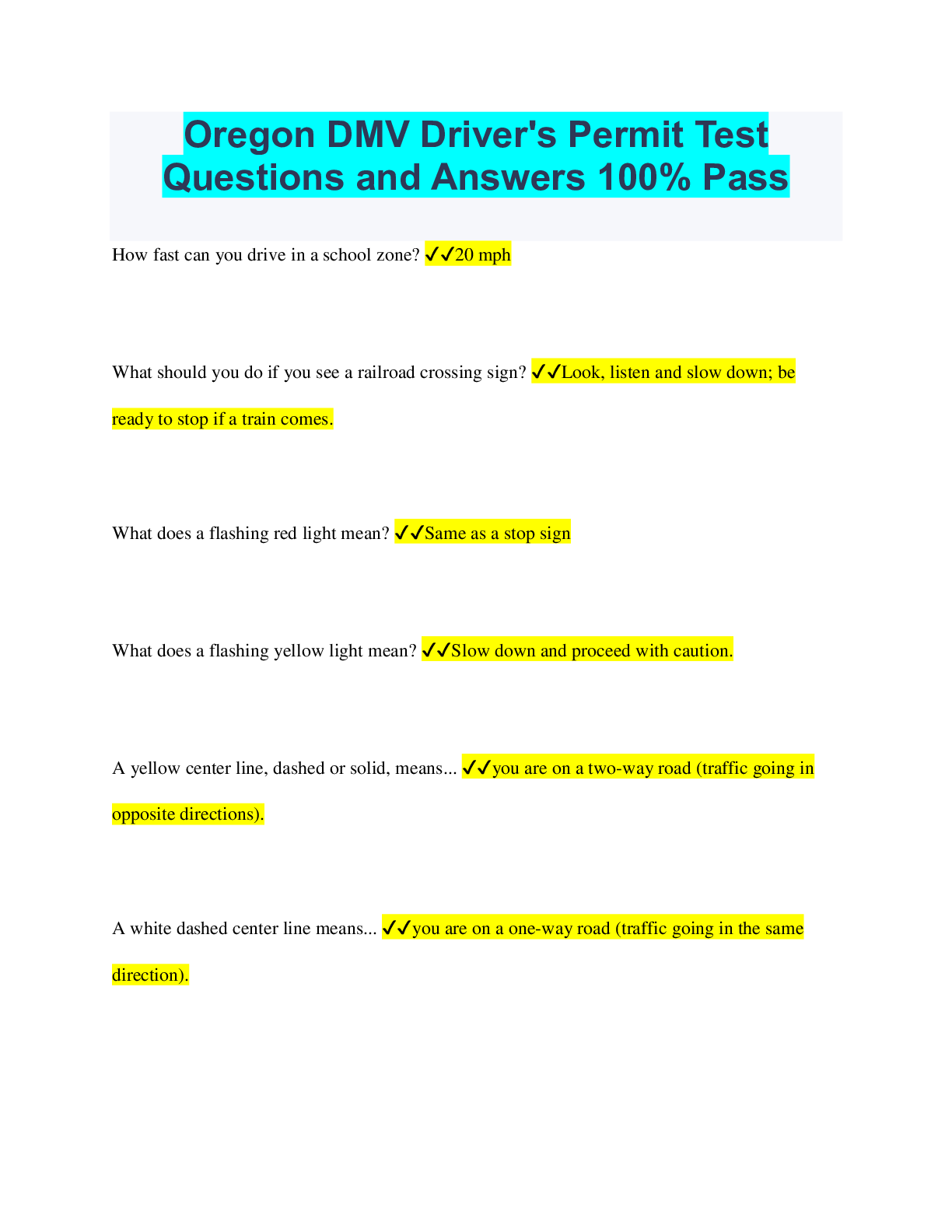
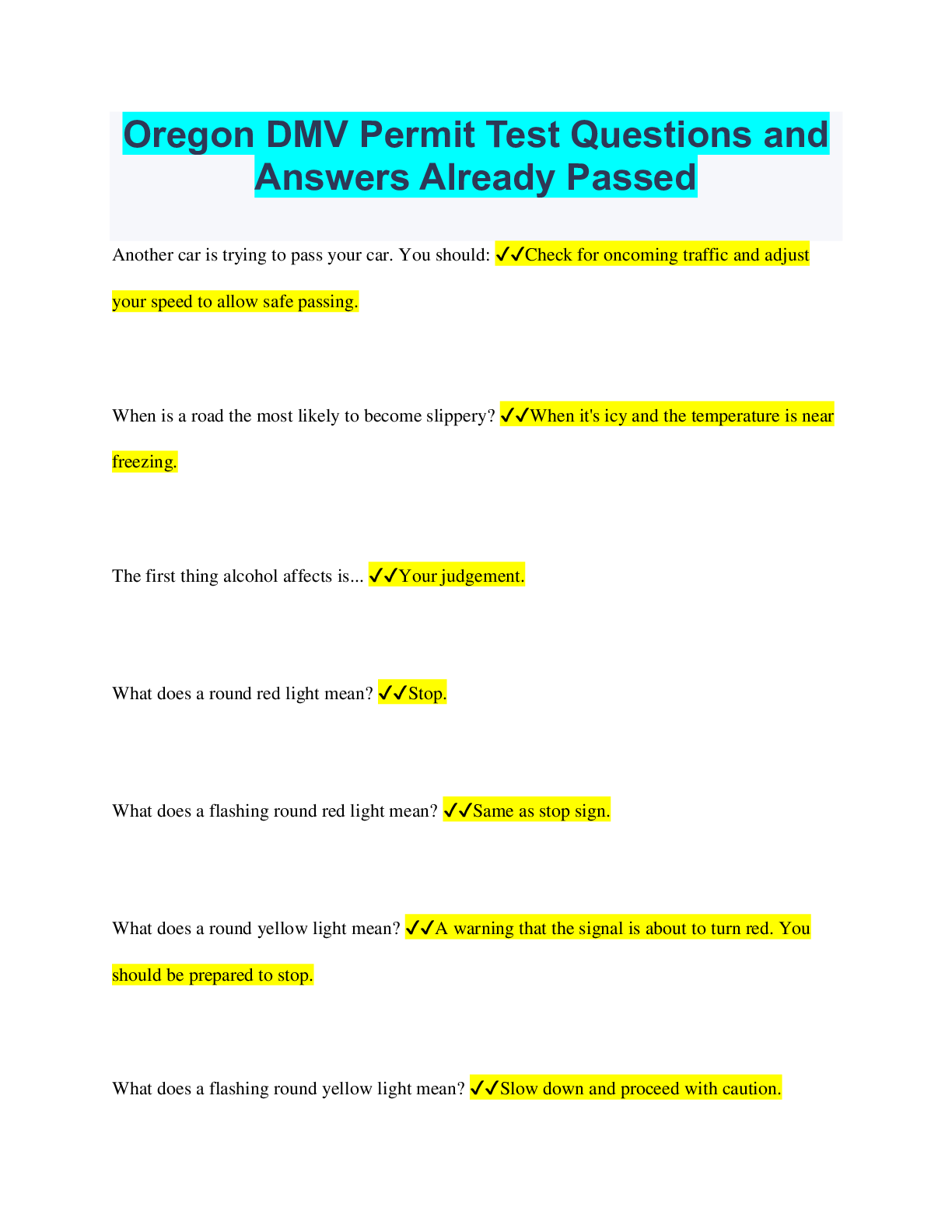
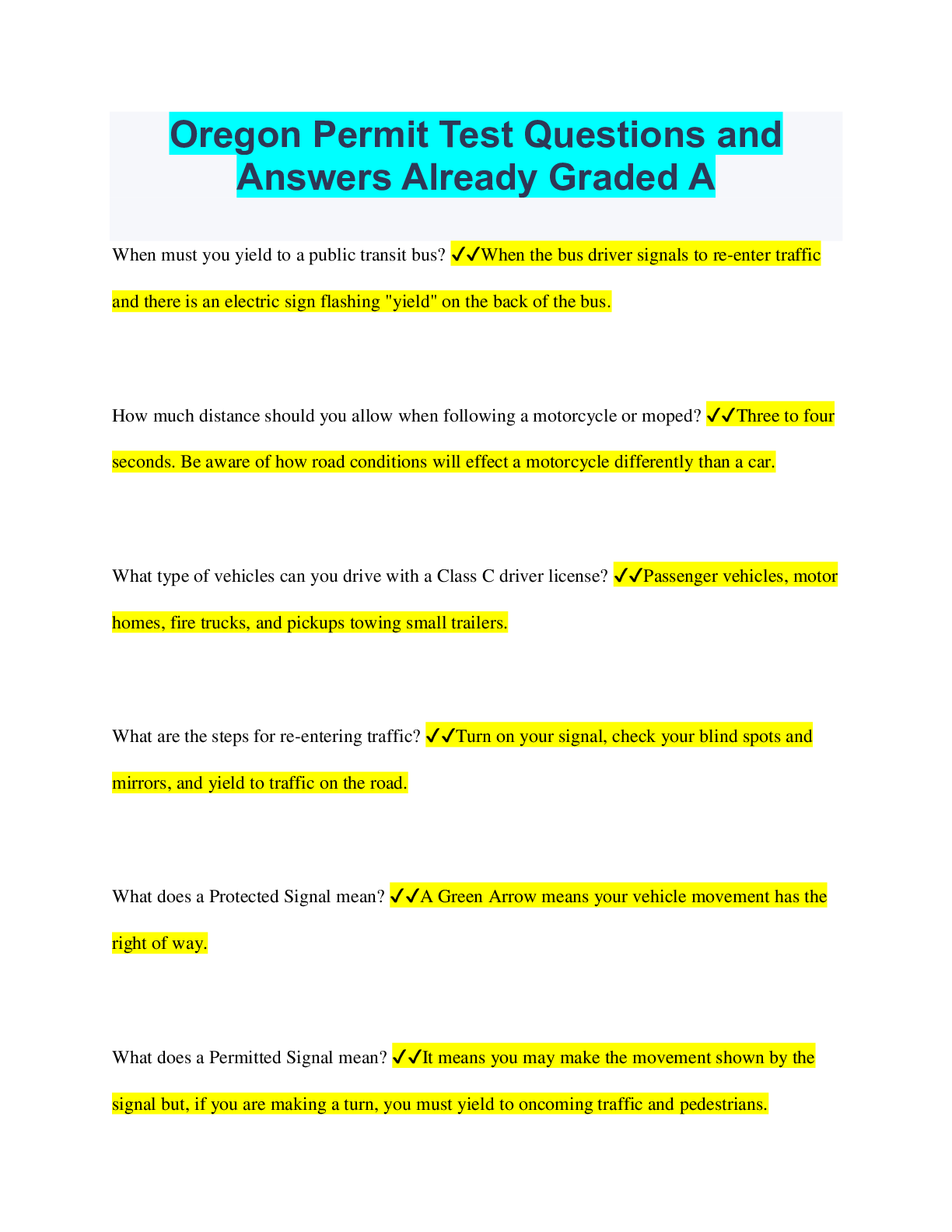
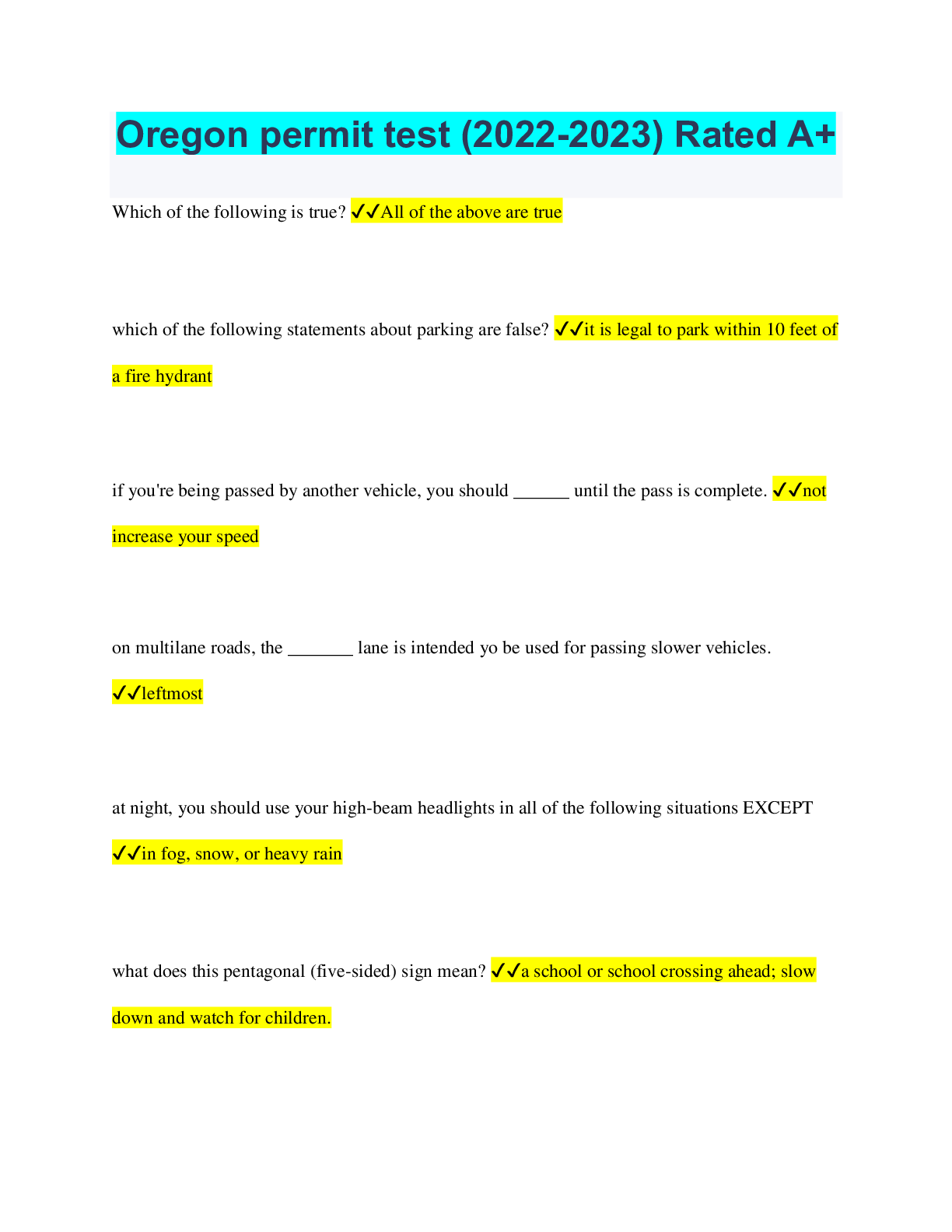
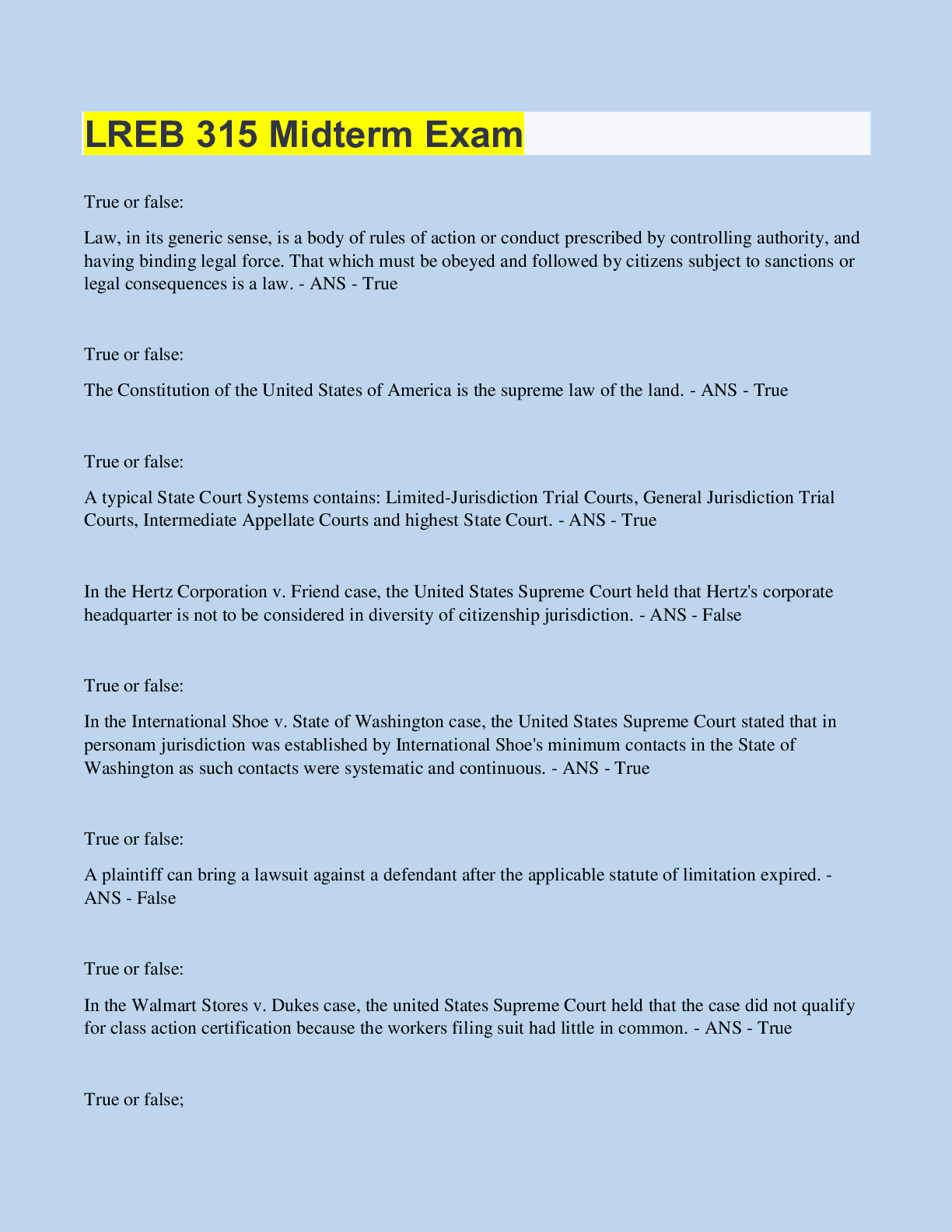
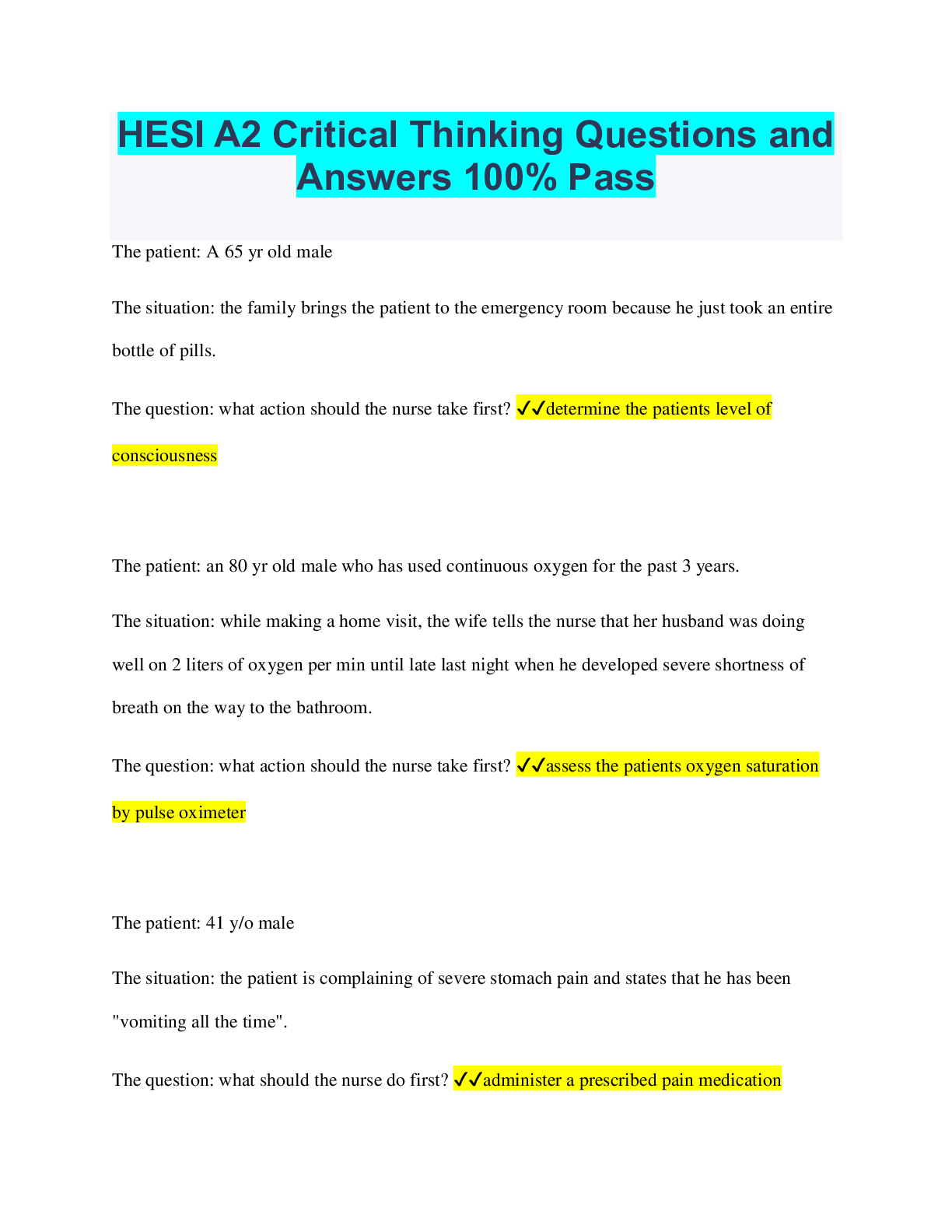





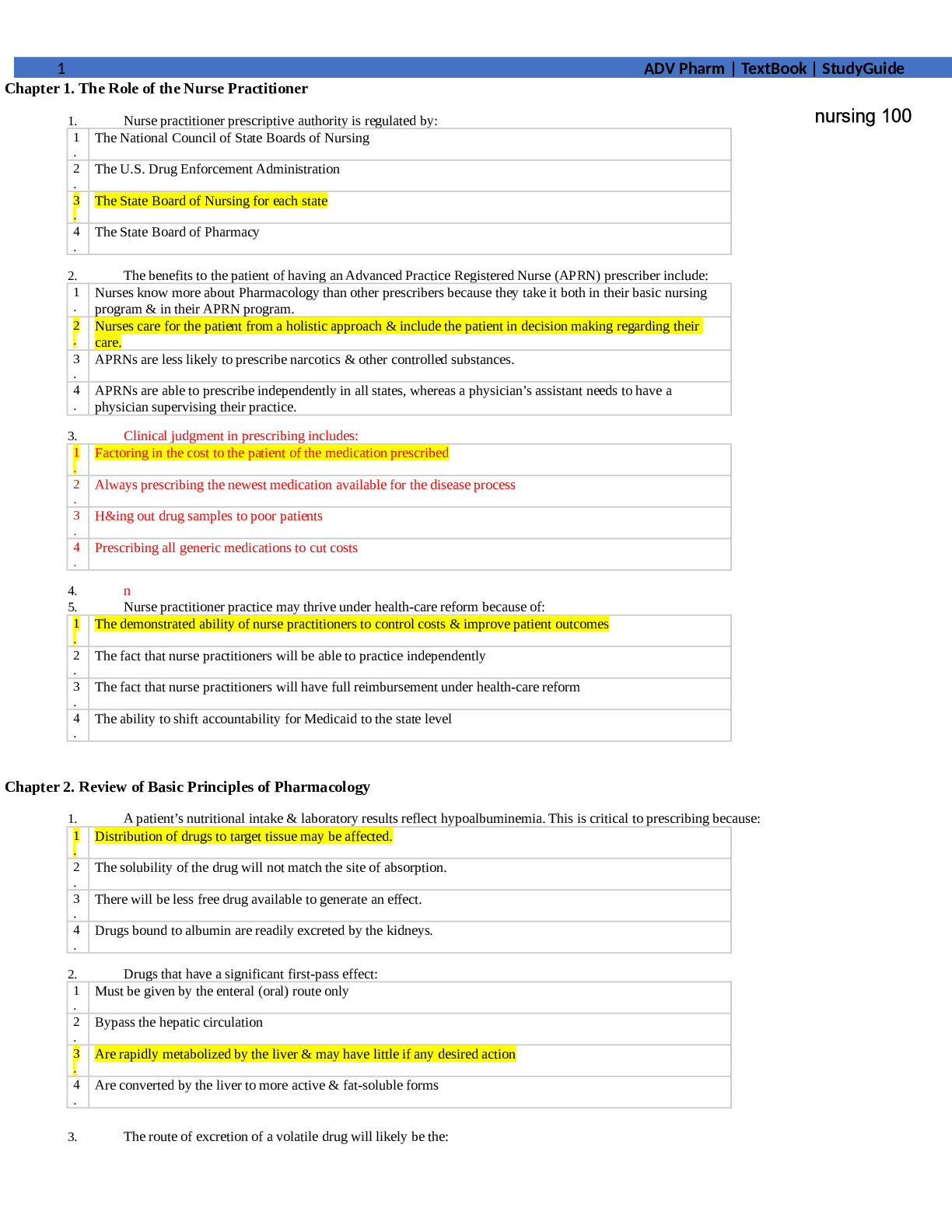

.png)
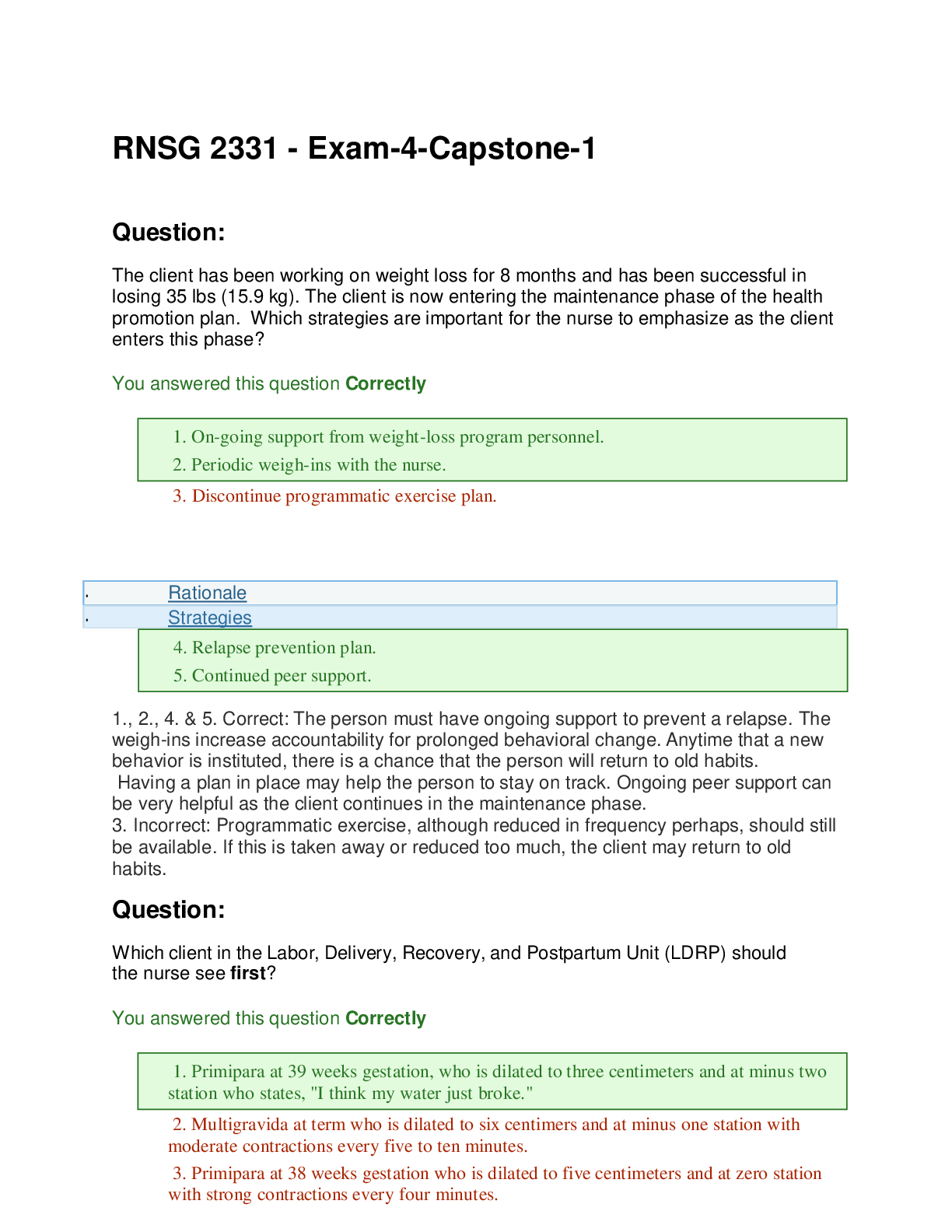


.png)

